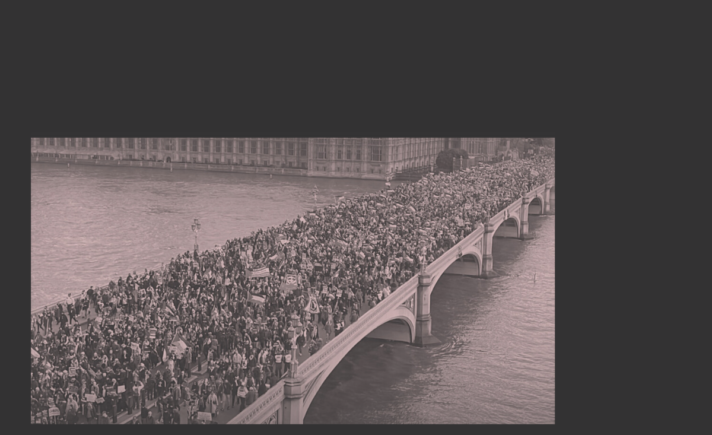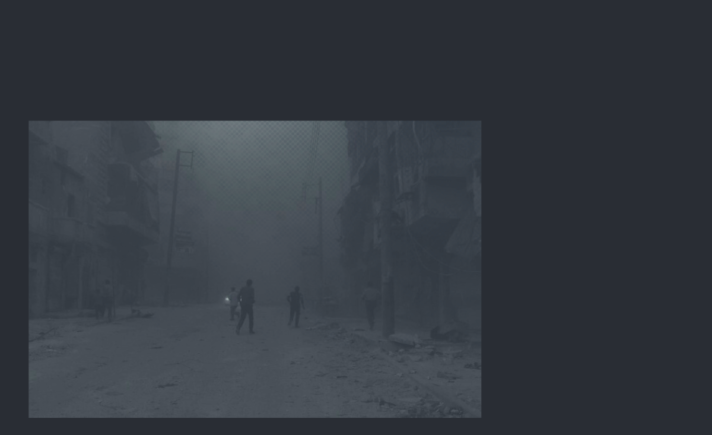“Israel was not looking for war. She respected a ceasefire that Iran-backed Hamas broke, at which point Israel had no choice but to react in self-defense. People understand that Israel, just like any other sovereign country, has a right to defend its citizens.”
The above statement could very well have been said a few days ago, by some Israeli official pressed in a TV interview about Israel’s relentless genocidal bombing of Gaza over the last two months.
In fact, these words were written in 2009 as part of the “Global Language Dictionary”, a study commissioned by the Israel Project and circulated privately to Israeli spokespeople as a guide to presenting Israel in the media. Those familiar with Western coverage of Palestine might feel an eerie sense of familiarity on reading it, a sensation akin to reading every Western interview and article about Israel and Palestine at the same time. Aside from trotting out the predictable tropes (“Israel’s right to self-defence”, “human shields”, “the only democracy in the Middle East”), it exposes the extraordinary degree to which Israeli spokespeople’s replies have been scripted, and how the tricks of logic, false equivalences and subtle changes of subject that we have become used to are in fact part of a media strategy orchestrated in precise detail.
Nevertheless, Israeli propaganda has continued to develop since 2009. While the Global Language Dictionary is still a significant resource, and strongly emblematic of their wider hasbara strategy, Israel has seen a dynamic change of tone since the October 7 attacks – one marked by stark moral absolutes, undisguised racial hatred and a refusal to temper their tone for an international audience. While Israel’s collective trauma and panic after the October 7th attack has played a role, this tone shift represents a pre-existing current of vitriolic Zionist sentiment coming to the surface, enabled by a political shift to the far-right, decades of impunity, and unconditional US support.
The Global Language Dictionary
The Israel Project was a non-profit organisation founded in 2003 and shut down in 2019. During that time, it specialised in pro-Israel media advocacy in the USA and Europe. Though officially claiming that it “does not lobby”, its board of advisors included 36 members of the US House of Representatives and US Senate in 2016. It conducted polling and public opinion research, advising political leaders, supplying information to journalists and news outlets, and advertising on US cable networks.
In 2009, the Israel Project commissioned Republican pollster Frank Luntz to write an updated handbook for “visionary leaders who are on the front lines of fighting the media war for Israel”, with a focus on influencing US public opinion. Although each of its 116 pages is marked “Not for distribution or publication”, the “Global Language Dictionary” was leaked almost immediately to Newsweek Online.
This document, essentially a step-by-step guide to propaganda, uses polling by the Israel Project and the “Luntz National Poll” to break down the most successful interviews and statements by pro-Israel politicians and spokespeople, and distill a series of rules on how to communicate best with “persuadables”. Throughout the text it refers to examples of “Words That Work” and “Words That Do Not Work”, in a series of chapters with titles such as “Talking about Children and the Culture of Hate” and “Israel on Campus Communications.”
“You must recognize that there are three kinds of people in how they view Israel—those who are with us and will always be with us, those who are against us and who will always be against us, and those who are “persuadable.” Your communications efforts should always focus on transporting the “persuadables” from a less favorable position on Israel to a more favorable position on Israel.”
Written with calculated and at times very cold practicality, it ranges from disingenuity to explicitly encouraging its spokespeople to lie. In places it is surprisingly frank about feigning empathy (“The first step to winning trust and friends for Israel is showing that you care about peace for BOTH Israelis and Palestinians”) and in others, it encourages its spokespeople to promote a view they do not personally agree with for the sake of persuading others to the cause. For example, since over 78% of Americans supported a two-state solution in 2009, one should feign support for one when talking to Americans.
In the language of today, it is a guide to gaslighting your opponent. There is no doubt that this document has been of special significance to Israel advocates since 2009, nor is there doubt over the intent of the piece: it was explicitly written to act as a guide for all spokespeople and leaders of Israel, whether or not it ended up achieving this ubiquity. Singing the praises of Netanyahu’s rhetoric, Luntz says “The challenge now is to get all of Israel’s spokespersons hitting the same notes.” And speaking of the recently-elected Barack Obama, he says “President Obama’s language is so similar to what we have recommended you say for years that he could easily be stealing straight from our playbook.”
But the true value of this text is that it allows us to see clearly the groundwork that has been laid over the last 14 years, through intensive and pervasive propaganda, for the widespread justification and encouragement of the genocide we are now seeing in Gaza.
Gaza, 2009 and 2023
Many of the content, style and framing recommendations from the Global Language Dictionary are perennially relevant and still very much in use by pro-Israel advocates today. Others have been seemingly dropped or sidelined, as part of a general shift of tone in Israeli media.
The text was a product of the aftermath of the 2008-2009 Gaza War, also known as the Gaza Massacre. As in the present assault, Israel had conducted air strikes on densely populated areas such as Gaza City and Khan Younis, followed by a ground invasion; as in the present assault, the death toll was horrifically disproportionate (1387 Palestinians, 9 Israelis). Unlike the present however, Israel had decided to halt the 2009 offensive, due partly to the damage to their international image.
It makes sense, then, that some of the text’s most illuminating contributions to our present context come from the chapter titled “Gaza: Israel’s Right to Self-Defence and Defensible Borders”. The below is quoted verbatim from the text.
So here is the five-step approach to talking about civilian casualties in Gaza:
- STEP 1 – Empathy: “All human life is precious. We understand that the loss of one innocent Palestinian life is every bit as tragic as the loss of an Israeli life.”
- STEP 2 – Admission: “We admit that Israel isn’t always successful at preventing civilian casualties…”
- STEP 3 — Effort: “We remain committed to doing everything in our power to preventing civilian casualties.” [sic]
- STEP 4 – Examples: “Let me tell you how our armed forces are trained, tasked, and operate to ensure that Palestinian civilians remain safe.”
- STEP 5 – Turn Tables: “It is a great tragedy that Iran‐backed Hamas shoots rockets at our civilians while hiding in their own. This causes tragic deaths on BOTH sides. What would you do if you were in this situation?”
Much of the “five-step approach” above remains easily identifiable in the statements of the Israeli government and spokespeople to this day. In a recent interview with CBS Evening News, Netanyahu trudged through a cursory “Any civilian death is a tragedy” (Step 1 – Empathy), before lamenting that “unfortunately we’re not successful” at minimising civilian casualties (Step 2 – Admission). He went on to say Israel was “doing everything we can to get the civilians out of harm’s way” (Step 3 – Effort), and pointed out that “we send leaflets… we call them on their cell phones, and we say leave” (Step 4 – Examples), missing no opportunity to blame Hamas for Palestinian deaths: “many have left, but Hamas tried to stop them at gunpoint and fired at the safe corridors that we provided for the Palestinians” (Step 5 – Turn tables). Clearly, 14 years on, the formula still holds good.
However, the two situations are not the same. The current assault on Gaza dwarfs anything it has seen in its long history of brutal Israeli attacks. Aside from the massive difference in scale and in death toll, it is the first time we hear open declarations of genocidal intent by Israeli officials. It is the first time that hospitals, schools and UN compounds are targeted, not as surreptitious war crimes to be concealed in the moment and then repented for later, but in full view of the world and with the full admission of the Israeli state. Craig Mokhiber, director of the New York office of UNHCR, resigned from his post citing a “textbook case of genocide”, and for many, the attack has raised existential questions about the future of international law.
Israeli discourse on the subject is also changing, and so far the most noticeable divergence from the five-step formula above has been in Step 1. The pretence of empathy, a hallmark of Israeli propaganda, has become scarce in official responses, replaced with an increase in virulent rhetoric that dehumanises Palestinians entirely. Minister of Defence Yoav Gallant’s declaration that “We are fighting human animals” opened the floodgates of dehumanisation: Sara Netanyahu, the wife of the prime minister, followed suit with a claim that “I don’t call them human animals because that would be insulting to animals,” and everyone from journalists and talk show hosts have joined in on the act.
The Mask Begins to Slip
The first chapter of Luntz’s text is titled “25 Rules for Effective Communication”. The first of these rules is as follows:
“Persuadables won’t care how much you know until they know how much you care. Show Empathy for BOTH sides!”
This foremost of rules appears to have been dropped from the discourse completely. On the surface, the lack of empathy can be put down to a very convincing cause: the attacks by Hamas on October 7th were the bloodiest and most brutal that Israel has ever witnessed in a single day. The widespread horror and trauma in the aftermath of the attack suggest an obvious truth: that people under attack are less likely than ever to extend empathy to their perceived enemy.
This is only half the picture, however, as two powerful factors had already begun to shift Israeli discourse long before October 7th.
The first is that Netanyahu’s coalition government of 2022 included ultra-Orthodox and far-right parties which have brought religious extremism and vehement racist currents well and truly into the political mainstream. The current Minister of Finance, Bezalel Smotrich, denies the existence of the Palestinian people and has described himself as a “fascist homophobe”; the Minister of National Security, Itamar Ben-Gvir, recently distributed 10,000 rifles to illegal settlers in the West Bank and has previously been filmed chanting “Gaza is a cemetery”. Both men are illegal settlers themselves. Netanyahu has also begun to court religious extremism more openly, as in his recent speech comparing Palestinians to the Biblical Amalek (in stark contrast to Luntz’s warning: “Don’t talk about religion.”) The surprise attack on October 7th was just the push needed to take this current of extremist rhetoric fully into the mainstream.
The second is that Israel has been testing the limits of its international impunity and its support from the USA. Aside from the considerable military assistance, the immediate US reaction to Israel’s attack on Gaza was one of unequivocal support for Israel’s narrative: not only did Biden repeat Israeli reports which were later proven false (including claims about “beheaded babies” which the White House then had to retract, and casting doubt on the Palestinian death toll), but an internal US State Department memo leaked on October 13th urged senior diplomats not to use the phrases “de-escalation/ceasefire”, “end to violence/bloodshed” and “restoring calm” in their press releases. Israel understandably interpreted these statements as a carte blanche for their actions in Gaza.
Luntz dedicates an entire chapter to “Loan Guarantees & Military Aid”, and advises advocates to talk about peace in order to keep the flow of US military funding. “If Americans see no hope for peace,” he writes, “Americans will not want their government to spend tax dollars or their President’s clout on helping Israel.”
The words and actions of the current Israeli government however, alongside the explosion of vitriol from Israeli public figures, show a different approach. The general tone of the country’s discourse has shifted from concern with defending its reputation on the world stage to something that more closely resembles flaunting its abuses. This is not at all surprising. The US approved a military aid package for $14.5 billion to Israel on November 3rd – by which point Israel had commenced its ground invasion, bombed Jabalia refugee camp and conducted airstrikes on at least three hospitals in Gaza. If Israel has come to believe that nothing it does could ever dissuade the US from its military support – if the support truly is unconditional – then they need put far less effort into securing it. In this case, the express aim of Luntz’s document – “to win new hearts and minds for Israel” in the USA – has lost much of its relevance. Why keep lobbying for something you now take for granted?
Hug Your Baby and Stand With Us
Nowhere is this more visible than in the rhetoric surrounding children. Standard Israeli rhetoric has been to showcase sympathy for Palestinian children by raising concerns about their radicalization. Luntz’s text suggests arguments such as: “We ask the Palestinian leadership to end the culture of hate in Palestinian schools”, noting that “the best way to crystallize the emotion of the issue is to put it in terms of what it means for the most vulnerable people – children.”
Israel’s killing of more than 5840 Palestinian children since October 7th has provoked a global wave of anguish and outrage, and is in many ways the most horrifying and egregious of Israel’s current crimes against humanity. And Israeli officials have been quick to express sympathy – for Israeli children. From October 7, the Israeli government and media were quick to capitalise on the false story about 40 babies beheaded by Hamas at Kfar Aza kibbutz, with Israel’s Foreign Affairs Ministry sharing a propaganda video about the murders on Youtube, targeted to the parents of young children: “Hug your baby and stand with us.”
The lives of Palestinian children, on the other hand, have been almost ignored by Israeli officials completely, questions about them deflected. Posed a direct question about the children of Gaza in an interview with RTÉ News, Israeli Government Spokesman Eylon Levy replied that “The suffering in the Gaza Strip, as a result of Hamas’s decision to declare war on us on October 7, is heartbreaking.”
Instead of the pretence of empathy for the children of Gaza, the narrative of radicalisation is now used to imply that any Gazan child could grow up to be a Hamas militant, and therefore, a legitimate military target. Various statements by officials show an attempt to incriminate Palestinian children, such as Isaac Herzog’s farcical claim of the IDF’s recovery of an Arabic Mein Kampf from a “children’s living room” in Gaza, or a member of the Knesset shouting that “the children of Gaza brought it upon themselves!” In one particularly poignant interview, Naftali Bennett, former Prime Minister of Israel, lost his cool at a question about the deaths of Palestinian children, exclaiming: “Are you seriously keeping asking me about Palestinian civilians? What’s wrong with you? Have you not seen what happened? We’re fighting Nazis!”
Another such casualty has been the fixation on advocating for peace – so eagerly advocated by Luntz, completely absent from the discourse today. Back in 2009, Luntz believed that articulating commitment to peace was the “trump card” for gaining support for Israel – regardless of whether the speaker believed the message or not. “You may not want to hear this,” he consoles his readers, “but the side that seems to want peace more will win the support of the non-aligned public.” Throughout the text he often comes back to the importance of reinforcing the message for peace.
“Have I written often enough yet that you need to start with empathy for both sides, remind your audience that Israel wants peace and then repeat the messages of democracy, freedom, and peace over and over again?”
It was, of course, a facade. Israel has a long history of feigning commitment to peace while continuing to expand settlements and brutalise Palestinians under occupation. Now the facade has all but vanished from the official discourse, and in its place is another favourite topic of the Luntz report: the War on Terror.
Civilisation against Barbarism
The current assault on Gaza has, of course, provoked a spike in public incitements to violence, and justification – and encouragement – of crimes against humanity. Officials and public figures who may once have been shyer about making their views known publicly are now expressing them with gusto. As Government minister Avi Dichter recently admitted in a news interview, “We are now rolling out the Gaza Nakba.” These kinds of admissions of genocidal intent have been made possible, as we have seen, by the utter dehumanisation of Palestinians in Israeli discourse and the renewed Israeli confidence in their own impunity.
It has also been made possible by deploying language associated with the War on Terror and 9/11, a tactic endorsed by Luntz and developed in depth. By linking American security to Israeli security, he expected to play on American national trauma to win support from those who were neutral. “Draw direct parallels between Israel and America,” he advised, “including the need to defend against terrorism.” For good measure, he focuses on Israel’s role in the Iraq War: “It was Israel who provided much of the intelligence that helped America defeat Iraq back in 1991… It is a partnership of democracies devoted to the war against terrorism and the fight for freedom.”
The word “terrorism” in particular, used frequently by both Israel and the USA, has become the basis for a logical sleight-of-hand trick. The reasoning is as follows: the population of Gaza elected the terrorist group Hamas in 2006, therefore everyone in Gaza is by extension a terrorist; since everyone in Hamas can be considered a terrorist, and one cannot make peace with terrorists, therefore there can be no peace with the Palestinians in Gaza. Isaac Herzog recently stated in a press conference, “It is an entire nation out there that is responsible. It is not true this rhetoric about civilians not being aware, not involved. It’s absolutely not true. They could have risen up.”
With all this in mind, it was not particularly surprising that the attacks on October 7th were instantly met with comparisons to “Israel’s 9/11”; one IDF spokesman described it, clearly with an American audience in mind, as “a 9/11 and a Pearl Harbour wrapped into one.”
For Israel, however, the framing of the War on Terror has taken on melodramatic proportions, with Hamas portrayed as the ultimate evil and Israel as the ultimate good, as if in some cosmic battle for civilisation. A tweet by Netanyahu, in which he called the conflict “a struggle between the children of light and the children of darkness”, apparently raised so many eyebrows that he later deleted it; but he still had no qualms framing the conflict, in an interview with NBC News, as “the war of civilisation against barbarism.” This semi-messianic language is a far cry from Luntz’s pleas to keep the tone grounded and to “use humility.”
Israel against the World
Israel has never had an uncomplicated relationship with the United Nations, but in 2009, Luntz felt that this was worth burying for the sake of the American public. “Yes, much of the world and many influential members of the United Nations are hostile to Israel’s existence,” he claims. “But the public doesn’t want to hear Israeli politicians complain about this fact.”
This is yet another facade to have fallen away.
Gilad Erdan, Israel’s envoy to the UN, has behaved most provocatively of any Israeli official since October 7. His angry outburst that “the UN no longer holds even one ounce of legitimacy or relevance” was followed by him and his team donning yellow stars of David at a Security Council meeting, in what may be the most depraved abuse of the memory of Holocaust Israel has engaged in.
Clearly, Israel no longer feels it has to play it safe on the world stage. In stark contrast to Luntz’s recommendation not to “stack your credibility up against the media’s”, we now see official figures such as the Deputy Mayor of Jerusalem, Fleur Hassan-Nahoum, condemn Amnesty International, B’Tselem and Human Rights Watch in the same interview, while accusing the UN of “managing a curriculum [in Gaza] that teaches hatred and how to kill Jews.”
Laying the Groundwork
The biggest shift in Israel’s use of language that has occurred in the years since the Israel Report’s study is that Israel has grown much bolder and less accountable. Whereas Luntz was keen for Israeli spokespeople to tailor their statements for the American public, even if it meant lying, the current period of discourse is characterised by the removal of the mask of decency and restraint. Openly genocidal and Jewish supremacist views go unchallenged or are openly celebrated, while officials make no attempt to hide their disregard and disdain for the international community and humanitarian organisations.
This shift is certainly due in part, or at least ignited by, an expression of grief and trauma at the severity and unexpectedness of Al-Aqsa Storm. But a paradigm shift had begun before that, and the removal of the carefully cultivated veneer is a result of political extremism coming to the fore, as well as decades of impunity and unconditional US support which have left Israeli politicians feeling entitled and comfortable enough that they no longer feel the need to pretend.
One can also not help but feel that the careful and strategic tailoring of its hasbara strategy to a Western audience has made Israel complacent in its use of it. Having made the effort of laying the groundwork – of which the Global Language Dictionary is one example – they have come to believe they can safely rely on certain ubiquitous phrases and soundbites which have been proven to work: “Israel has a right to defend itself”, “take out Hamas”, “human shields”, said as if with a shrug.
But the careful cultivation and orchestration of their media strategy has had another effect: to slowly but surely accustom Westerners to pro-Israel arguments through constant media exposure to Israeli narratives. As a result, many Westerners have wholeheartedly accepted the most noxious lie of all: that the ongoing genocide of the Palestinian people is an expression of Israel’s right to self-defence.
Luntz’s propaganda manual, now out of date, created a generation of spokespeople and officials who could effectively manipulate and deceive audiences. The Israel we are seeing today is far less apologetic and defensive, far more confident in its standing on the world stage – and far more willing to show the world its true face.





